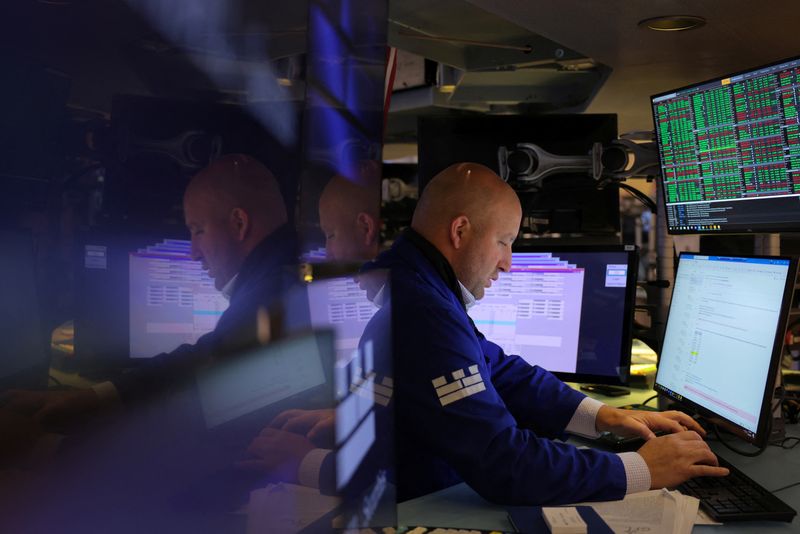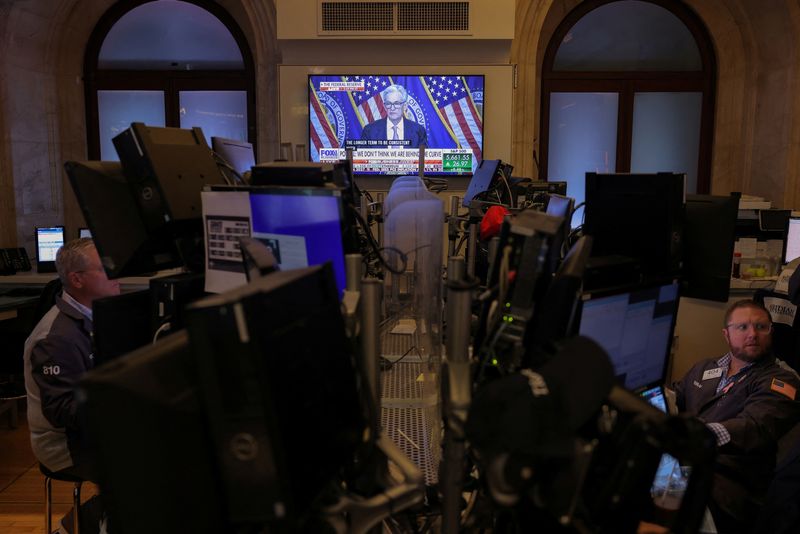By Caroline Valetkevitch
NEW YORK (Reuters) -U.S. stocks ended lower, with the Nasdaq losing more than 1%, on Tuesday as investors grew more cautious after Iran fired missiles at Israel.
Iran launched the salvo of ballistic missiles in retaliation for Israel's campaign against Tehran's Hezbollah allies. In response, U.S. President Joe Biden directed the U.S. military to aid Israel's defense and shoot down missiles aimed at Israel, the White House National Security Council said.
While the broader market fell, shares of energy companies rose along with U.S. oil prices, which settled up 2.4%. Shares of Exxon Mobil (NYSE:XOM) gained 2.3%.
Defense stocks also rose, including Northrop Grumman (NYSE:NOC), which rallied 3%, and Lockheed Martin (N:LMT), up 3.6%. The S&P 500 aerospace and defense index climbed to a record high. Utilities were up 0.8%.
Airline shares fell, including Delta Air Lines (NYSE:DAL), which was down 1.6%.
Investors avoided risk following the Middle East news, but indexes ended off their lows of the day.
"If we do see further escalation I could see continued market weakness because we just don't know how far this is going to go," said Peter Tuz, president of Chase Investment Counsel in Charlottesville, Virginia.
"The level of risk has increased. The markets have had a good year and people can get scared out of the market depending on what happens over the next couple of weeks."
The Dow Jones Industrial Average fell 173.18 points, or 0.41%, to 42,156.97, the S&P 500 lost 53.73 points, or 0.93%, at 5,708.75 and the Nasdaq Composite dropped 278.81 points, or 1.53%, to 17,910.36.
On Monday, the three major U.S. indexes scored strong gains for September and for the quarter.
CBOE's market volatility index, Wall Street's fear gauge, rose.
Data released early on Tuesday showed U.S. job openings rebounded in August, while the Institute for Management Supply's (ISM) report showed manufacturing activity stood at 47.2 in September, versus estimates of 47.5.
Investors were also cautious ahead of U.S. jobless claims data on Thursday and monthly payrolls on Friday.
Traders are pricing in a 38% chance that the Federal Reserve will lower interest rates by 50 basis points in November, up from bets of around 35% on Monday but down from 58% a week ago, CME Group's (NASDAQ:CME) FedWatch Tool showed.
The U.S. central bank on Sept. 18 cut rates by 50 basis points, kicking off a new easing cycle.
Investors also monitored a port strike on the East Coast and the Gulf Coast, halting the flow of about half the nation's ocean shipping.
The strike that began on Tuesday is not expected to cause global supply problems as deep or severe as during the COVID-19 pandemic, but still creates more economic uncertainty for Fed policymakers to assess.
Declining issues outnumbered advancing ones on the NYSE by a 1.32-to-1 ratio; on Nasdaq, a 2.36-to-1 ratio favored decliners.

The S&P 500 posted 51 new 52-week highs and two new lows; the Nasdaq Composite recorded 75 new highs and 137 new lows.
Volume on U.S. exchanges was 13.16 billion shares, compared with the 11.98 billion average for the full session over the last 20 trading days.
